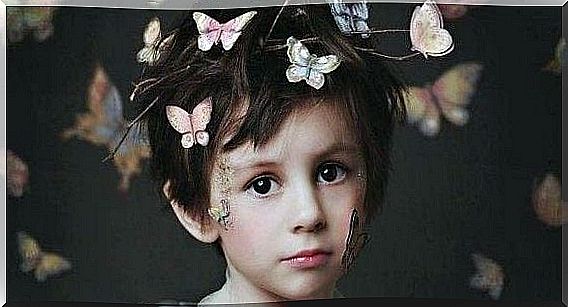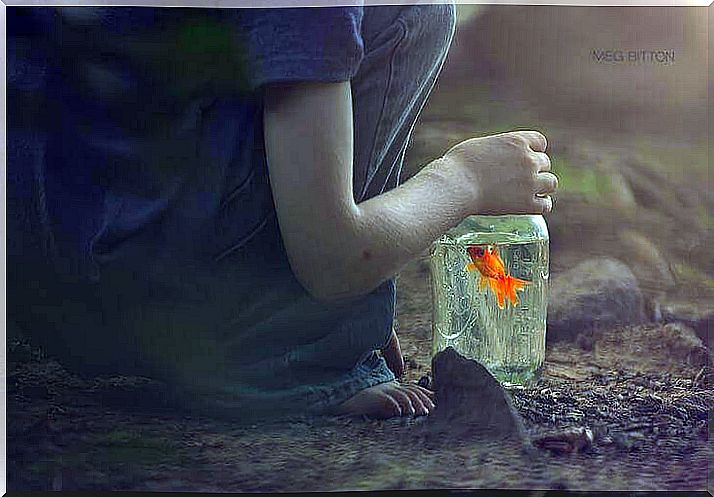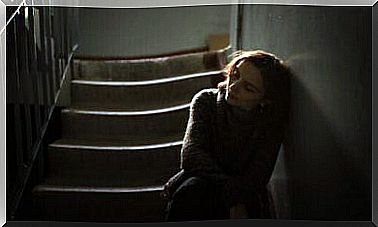Three Childhood Scars That Last Forever

Childhood is that moment of life in which a beautiful paradox occurs: we are able to put concrete foundations in a very short time without even realizing it, but at the same time leave very deep scars. At the age of 4, our way of being is already beginning to be defined. From that moment on, all that remains is to develop or curb the inertia we assumed during our first years of life.
Childhood leaves scars that last forever. They are indelible signs, which are mainly reflected in the attitude we take towards ourselves and towards others. However, some of these scars are more persistent and deeper, due to the large impact they cause on a child’s mind.
Below we will talk about 3 scars that open in childhood and never completely heal.
3 scars that open in childhood
The inability to trust from childhood

When a child is persistently manipulated or betrayed by his parents or guardians, he will hardly trust other people or himself. He will have to fight with all his strength against that tendency to lack confidence in order to be able to establish intimate bonds with others.
A child is cheated when he is promised things that he cannot have or that he is not committed to doing. For this reason, it is important to give a child the toy you promised him, take him to play in the park on the day set together and dedicate the time you promised to dedicate to him.
These actions in the eyes of adults can go unnoticed or unimportant. However , for children they are a lesson in what to expect from loved ones in general.
If a child observes that his parents are lying, he will learn that words have little value. He will therefore have a hard time believing what others are saying and making an effort to respect his own words. This scar implies that, during development, the child will have great difficulty in forming relationships with others and building a true intimacy – refuge – in which he feels safe with someone.
The fear of abandonment
A child who has felt lonely, ignored or abandoned will begin to believe that loneliness is totally negative and will opt for one of the following choices: he will become overly dependent on others, constantly looking for someone to protect and accompany him, or he will give up company. of the others, as a precautionary measure in order not to suffer potential abandonment.
Those who follow the trail of addiction will be able to tolerate any type of relationship in order not to feel alone. They believe they are completely unable to cope with loneliness and, for this, are willing to pay any price for the company.
Those who run away from the fear of abandonment on the path of indefinite independence are unable to enjoy the sincere affection of a loved one. For these people, love is synonymous with fear. The more affection they feel for another person, the more their anxiety and desire to escape will grow. They are the classic people willing to put an end to an enviable relationship for the anguish that would cause them a possible loss of the beloved figure.
Fear of rejection

A child who has been continually criticized and belittled by his parents becomes his own enemy. In this way, he develops an inner dialogue in which the constants are self-reproach and self-recrimination.
This child, in adulthood, will probably never feel in agreement with what he does or thinks. He will always find ways to sabotage his plans and it will be difficult for him to understand that he also has virtues and that he can be successful. He will feel that he does not deserve the affection or understanding of anyone, and that his expressions of love towards others lack validity.
In general, these children will turn into isolated and elusive adults, who will panic in situations of social contact. At the same time, they will be extremely dependent on the opinions of others. In the face of every slightest criticism, they completely belittle themselves, since they cannot distinguish an objective observation from a personal attack.
If in addition to being rejected, the child has also been humiliated, the consequences will be even more serious. Humiliation leaves unresolved feelings of anger, which turn into a continual feeling of helplessness. This condition often transforms people, making them tyrannical and insensitive, and leading them to humiliate others.
The scars left by these childhood experiences are very difficult to heal. However, this does not mean that it is not possible or that they cannot transform positively. The first step is to recognize them and to be aware that we must work on them, to prevent them from determining the rest of our life.










